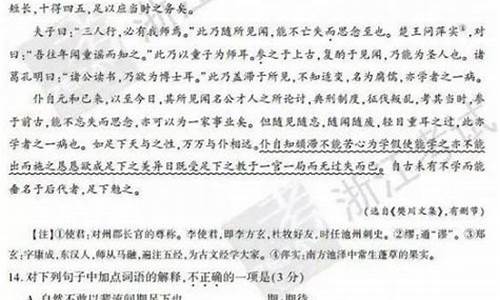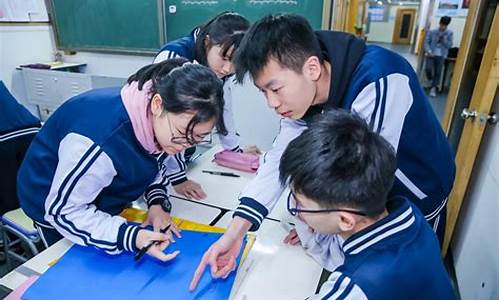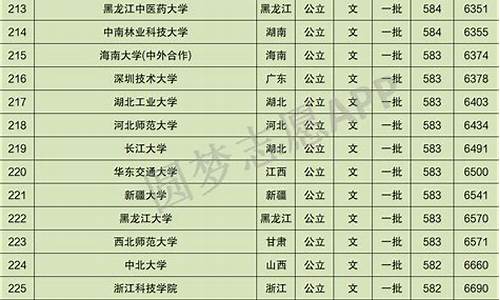您现在的位置是: 首页 > 教育改革 教育改革
2017高考浙江阅读理解,2017年浙江高考阅读
tamoadmin 2024-05-20 人已围观
简介1.2017高考英语真题分类汇编阅读理解真题及答案 书是随时在近旁的顾问,随时都可以供给你所需要的知识,而且可以按照你的心愿,重复这个顾问的次数,下面给大家分享一些关于以气候正义为视角阅读题答案,希望对大家有所帮助。 中国参与国际气候治理的法律立场和策略:以气候正义为视角 气候正义是环境正义在气候变化领域的具体发展和体现。2000年前后,一些非政府组织承袭环境正义运动的精神,开始对气候变化
1.2017高考英语真题分类汇编阅读理解真题及答案

书是随时在近旁的顾问,随时都可以供给你所需要的知识,而且可以按照你的心愿,重复这个顾问的次数,下面给大家分享一些关于以气候正义为视角阅读题答案,希望对大家有所帮助。
中国参与国际气候治理的法律立场和策略:以气候正义为视角
气候正义是环境正义在气候变化领域的具体发展和体现。2000年前后,一些非政府组织承袭环境正义运动的精神,开始对气候变化的影响进行伦理审视,气候正义便应运而生。气候正义关注的核心主要是在气候容量有限的前提下,如何界定各方的权利和义务,主要表现为一种社会正义或法律正义。
从空间维度来看,气候正义涉及不同国家和地区之间公平享有气候容量的问题,也涉及一国内部不同区域之间公平享有气候容量的问题,因而存在气候 文化 的国际公平和国内公平问题。公平原则应以满足人的基本需求作为首要目标,每个人都有义务将自己的“碳足迹”控制在合理范固之内。比如说,鉴于全球排放空间有限,而发达国家已实现工业化,在分配排放空间时,就应首先满足发展中国家在衣食住行和公共基础设施建设等方面的基本发展需求,同时通制在满足基本需求之上的奢侈排放。
从时间维度来看,气候正义涉及当代人与后代之间公平享有气候容量的问题,因而存在代际权利义务关系问题。这一权利义务关系,从消极方面看,体现为当代人如何约束自己的行为来保护地球气候系统,以将同等质量的气候系统交给后代;从积极方面看,体现为当代人为自己及后代设定义务。就代际公平而言,地球上的自然资源在代际分配问题上应实现代际共享,避免“生态赤字”。因为,地球这个行星上的自然资源包括气候资源,是人类所有成员,包括上一代、这一代和下一代,共同享有和掌管的。我们这一代既是受益人,有权使用并受益于地球,又是受托人,为下一代掌管地球。我们作为地球的受托管理人, 对子 孙后代负有道德义务。实际上,气候变化公约或协定把长期目标设定为保护气候系统免受人为原因引起的温室气体排放导致的干扰,其目的正是为了保护地球气候系统,这是符合后代利益的。至少从我们当代人已有的科学认识来看,气候正义的本质是为了保护后代的利益,而非为其设定义务。
总之,气候正义既有空间的维度,也有时间的维度,既涉及国际公平和国内公平,也涉及代际公平和代内公平。因此,气候正义的内涵是:所有国家、地区和个人都有平等地使用、享受气候容量的权利,也应公平地分担稳定气候系统的义务和成本。
(摘编自静明德《中国参与国际气候治理的法律立场和策略:以气候正义为视角》)
1.下列关于原文内容的理解和分析,正确的一项是
A.为了应对气候变化,非政府组织承袭环境正义运动的精神,提出了气候正义。
B.与气候变化有关的国际公平和国内公平问题,实际上就是限制排放的问题。
C.气候正义中的义务问题,是指我们对后代负有义务,而且要为后代设定义务。
D.已有的科学认识和对利益分配的认识都会影响我们对气候正义内涵的理解。
参考答案D
命题立意本题考查考生理解语句、筛选并整合文中信息的能力。能力层级为B级、c级。
试题分析本题要求考生选出表述正确的一项,答案是D。A项来源于原文第一段,提出气候正义是为了应对气候变化带来的影响,故A项错。B项来源于原文第二段,限制排放只是一个具体的方面,不能涵盖与气候变化有关的国际国内公平问题的全部,故B项错。C项来源于原文第三段,气候正义中的义务问题不仅指对后代负有义务,也指对我们自己负有义务,故c项错。D项既来源于原文第三段的一个细节,也是对全文的概括。原文说“至少从我们当代人已有的科学认识来看,气候正义的本质是为了保护后代的利益”,这表明已有的科学认识影响了对气候正义内涵的理解;而全文重点谈的是利益分配的问题,可见如何认识利益分配,也影响理解。故D项正确,是本题答案。
2.下列对原文论证的相关分析,不正确的一项是
A. 文章 从两个维度审视气候正义,并较为深入地阐述了后一维度的两个方面。
B.文章以气候容量有限为立论前提,并由此指向了气候方面的社会正义问题。
C.已文章在论证中以大量篇幅阐述代际公平,彰显了立足未来的气候正义立场。
D.对于气候正义,文章先交代背景,接着逐层分析,最后梳理出了它的内涵。
参考答案C
命题立意本题考查考生分析论点、论据和论证 方法 的能力。能力层级为C级。
试题分析本题要求考生选出对原文论证的相关分析不正确的一项,答案是C。A项是对原文论证思路的一个重要方面的分析。原文谈到空间维度和时间维度,而时间维度又分为消极和积极两个方面,论述更加深入一些,故A项正确。B项是对原文的立论前提和指向性的分析。原文说“气候正义关注的核心主要是在气候谷里有限的前提下,如何界定各方的权利和义务,主要表现为一种社会正义或法律正义”,可见立论前提是气候容量有限,社会正义是被指向的同题之一。故B项正确。C项是对原文论证立场的分析。原文确有大量篇幅在阐述代际公平问题,但也只是把它作为各类公平问题中的一类来讨论的,而且更加注重的是当下我们这一代的问题,并没有立足未来,故c项错误,是本题答案。D项是对原文整个论证思路的分析。原文说非政府组织以环境正义运动的精神审视气候变化的影响,气候正义应运而生,这交代了背景,接下来从两个维度看,这是逐层分析,最后说“气候正义的内涵是……”,这便说明原文最终梳理出了气候正义的内涵。故D项正确。
3.根据原文内容,下列说法不正确的一项是
A.如果气候容量无限,就不必对气候变化进行伦理审视、讨论气候的正义问题。
B.如果气候变化公约或协定的长期目标能落实,那么后代需求就可以得到保证。
C.只有每个人都控制“碳足迹”,从而实现了代际共享,才能避免“生态赤字”。
D.气候容量的公平享有是很复杂的问题,气候正义只是理解该问题的一种视角。
参考答案B
命题立意本题考查考生整合文中信息并进行分析和推断的能力。能力层级为C级。
试题分析本题要求考生选出说法不正确的一项,答案是B。A项是根据原文立论的前提做出的推断。如果气候容量有限这一前提被替换为气候容量无限,那么,相应的伦理审视、气候正义的问题就缺乏前提,故A项正确。B项是根据原文“气候变化公约或协定把长期目标设定为保护气候系统免受人为原因引起的温室气体排放导致的干扰,其目的正是为了保护地球气候系统,这是符合后代利益的”做的推断。落实长期目标只跟后代利益有关,不能保证后代的需求,尤其不能保证后代可能存在的诸如奢侈排放之类的需求。故B项错误,是本题答案。C项是根据原文多处细节做出的推断,如原文强调每个人都应该将自己的“碳足迹”控制在合理范围内,相应的公平问题才能实现,又特别强调代际公平方面实现了代际共享才能避免“生态赤字”,归结起来就是C项的表述,故C项正确。D项是根据原文论述的重心和视角做出的推断,带有对原文观点及其论证的评价性质。原文从国际、国内、代际、代内及国家、地区、个人等诸多层面展现了气候容量公平享有的复杂性,又强调气候正义作为视角有其独特的关注核心,可见气候容量的公平享有是个复杂的问题,可以、值得并且需要从其他角度进行讨论。故D项正确。
以气候正义为视角阅读题答案相关文章:
★ 2017高考语文全国一卷答案解析官方版
★ 高考语文试卷真题
★ 选择的阅读题及答案
★ 人生考题的阅读题答案
★ 爱无隙阅读题答案
★ 说明文阅读题及答案
★ 做自己的预言家阅读题答案
★ 《播种希望的日子》阅读题答案
★ 生命之歌阅读题答案
★ 最是读书滋味长阅读题及参考答案
2017高考英语真题分类汇编阅读理解真题及答案
高考英语阅读理解精品训练2017
近几年高考英语阅读主要有猜测词义、理解主旨大意、推理判断、对文章的细节理解、 数据推算等几种题型。为了帮助大家备考高考英语阅读理解题,我分享了一些高考英语阅读理解练习,希望能对大家有所帮助!
阅读理解练习1
Not many years ago, a wealthy and rather strange old man named Johnson lived alone in a village in the south of England. He had made a lot of money in trading with foreign countries. When he was seventy?five, he gave ? 12,000 to the village school to buy land and equipment (设备) for a children?s playground.
As a result of his kindness, many people came to visit him. Among them was a newspaperman. During their talk, Johnson remarked that he was seventy-five and expected to live to be a hundred. The newspaperman asked him how he managed to be healthy at seventy?five. Johnson had a sense of humour (幽默). He liked whisky (威士忌酒) and drank some each day. ?I have an injection (注射) in my neck each evening.?he told the newspaperman, thinking of his evening glass of whisky.
The newspaperman did not understand what Johnson meant. In his newspaper he reported that Johnson was seventy?five and had a daily injection in his neck. Within a week Johnson received thousands of letters from all over Britain, asking him for the secret of his daily injection.
1. Johnson became a rich man through
A. doing business. B. making whisky. C. cheating. D. buying and selling land.
2. The gift of money to the school suggests that Johnson
A. had no children. B. was a strange man.
C. was very fond of children. D. wanted people to know how rich he was.
3. Many people wrote to Johnson to find out
A. what kind of whisky he had. B. how to live longer.
C. how to become wealthy. D. in which part of the neck to have an injection.
4. The newspaperman
A. should have reported what Johnson had told him.
B. shouldn?t have asked Johnson what injection he had.
C. was eager to live a long life.
D. should have found out what Johnson really meant.
5. When Johnson said he had an injection in his neck each evening, he really meant that
A. he liked drinking a glass of whisky in the evening.
B. he needed an injection in the neck.
C. a daily injection in the evening would make him sleep well.
D. there was something wrong with his neck.
阅读理解练习2?I?m very tired from working here,?said Jean to her friend Kate,? I?m on my feet from morning to night. For the first quarter of the day, I clean up the counter (柜台) and set the tables. For the next quarter, I help in the kitchen. For the second half of my workday, I take orders at the counters.?
?Kate, I wish I had your job,?Jean went on. ?For four hours you just sit at the cash register (收款台) taking in money.?
?But I spend two more hours in the kitchen (厨房) than you do,?said Kate. ?It?s tiring to cook over a hot stove. I don?t think you?d really want my job. In fact, I?d like your job.?
1. Both Jean and Kate probably work in a
A. hotel B. library C. lab D. shop
2. How long did they work every day?
A. eight hours B. twelve hours. C. Ten hours D. Nine hours
3. How long did Kate spend in the kitchen?
A. a quarter day. B. A half day. C. One-third day. D. Three-fourths day.
4. From this passage we can see that
A. they are both interested in their work. B. their work is neither tiring nor busy.
C. both of them are tired of their work. D. they?ve decided to give up their work.
5. Give a proper proverb (谚语) to Jean and Kate.
A. It?s never too late to learn.
B. It?s no use crying over spilt milk.
C. The grass is always greener on the other side.
D. One swallow(燕子) does not make a summer.
阅读理解练习3In 1985 a French television company sent its reporters to the Paris Metro. They took cameras to see what passengers would do if they saw someone attached on the platform or in the trains. They acted out incidents. The incidents looked real but they were all done with the help of actors. However, very few people tried to help, and most passengers pretended not to notice. in one incident, a foreigner was attacked by three men. The attack was on a train which was quite full, and although one man tried to get the passengers to help, they all refused. It seems that such behaviour(行为) is not unusual, but the question is why? Is it a problem of big cities, or would the same thing happen anywhere? To discuss these questions, we have in the studio(演播室) Professor Wilson, who is an expert on the subject?
1. Who did the experiment?
A. A French television company. B. The Paris Metro.
C. The City Government of Paris. D. Professor Wilson.
2. What did the experiment try to find out?
A. How a foreigner was attacked on the train.
B. How passengers helped each other on the platform.
C. Passengers? reactions towards incidents.
D. Actors? performances during incidents.
3. What was the finding of the experiment?
A. Passengers helped a lot during incidents.
B. Very few foreigners were on the train.
C. Very few passengers tried to help during incidents.
D. Some people were good at acting on the train.
4. Who do the underlined words one man refer to?
A. One of the three men who attacked a foreigner.
B. One of the actors who took part in the experiment.
C. One of the passengers who were on the train.
D. One of the reporters who were sent to the Paris Metro.
参考答案:
1A 2 C 3 D 4 D 5 A
1A 2 A 3 B 4 C 5 C
1D 2 C 3 C 4 B
;考生能否在英语科考试中取得高分取决于阅读理解的成绩。一起做一下阅读理解训练吧。下面是我为大家推荐的2017高考英语真题分类汇编阅读理解真题及答案,仅供大家参考!
2017高考英语真题分类汇编阅读理解真题及答案一
In one way of thinking, failure is a part of life. In another way, failure may be a way towards success. The ―spider story‖ is often told. Robert Bruce, leader of the Scots in the 13th century, was hiding in a cave from the English. He watched a spider spinning a web(蜘蛛织网). The spider tried to reach across a rough place in the rock. He tried six times without success. On the seventh time he made it and went on to spin his web. Bruce is said to have taken heart and to have gone on to defeat the English? Edison, the inventor of the light bulb, made hundreds of models that failed before he found the right way to make one.
So what? First, always think about your failure. What caused it? Were conditions right? Were you in top from yourself? What can you change so things will go right next time?
Second, is the goal(目标)you're trying to reach the right one? Try to do some thinking about what your real goals may be. Think about his question, ?If I do succeed in this, where will it get me?This may help you prevent failure in things you shouldn't be doing anyway.
The third thing to bear in mind about failure is that it's a part of life. Learn to ―live with yourself‖ even though you may have failed. Remember, ―You can't win them all.‖
1.This passage deals with two sides of failure. In paragraph 1, the author talks mainly about ______ .
A.the value of failur B.how people would fail
C.famous failures D.the cause of failure
2.The underlined phrase?made it?means ______ .
A.succeeded B.failed C.gave D.got
3.The lesson the spider taught Robert Bruce seems ______ .
A.productive B.straight forward C.sorrowful D.deep
4.The author tells you to do all things except ______ .
A.The think about the cause of your failure
B.to check out whether your goals are right for you
C.to consider failure as a part or life
D.to bear in mind that you will never fail in your life
5.Which of the following is NOT true?
A.Bruce and Edison were successful examples. B.Failure may be regarded as a way toward success.
C.Edison learned a lot from the lesson the spider taught Robert Bruce.
D.One may often raise a question whether his goals are worth attempting.
2017高考英语真题分类汇编阅读理解真题及答案二
In sport the sexes(性别)are separate. Women and men do not run or swim in the same races. Women are less strong than men. That at least is what people say. Women are called the weaker sex, or, if men want to please them, the fair sex. But boys and girls are taught together at schools and universities. There are women who are famous Prime Ministers, scientists and writers. And women live longer than men . A European woman can expect to live until the age of 74, a man only until he is 68.Are women's bodies really weaker?
The fastest men can run a mile in under 4 minutes. The best women need 4.5 minutes. Women's time are always slower than men's, but some facts are a surprise. Some of the fastest women swimmers today are teenage girls. One of them swam 400 metres in 4 minutes 21.2 seconds when she was only 16.The first?Tartan?in film was an Olympic swimmer, Johnny Weissmuller. His fastest 400 metres was 4 minutes 49.1 seconds, which is 37.9 seconds slower than a girl 50 years later! This does not mean that women are catching men up. Conditions are very different now and sport is much more serious. It is so serious that some women athletes are given hormone (荷尔蒙)injections(注射). At the Olympics a doctor has to check whether the women athletes are really women or not. It seems sad that sport has such problems. Life can be very complicated(复杂的) when there are two separate sexes!
1.Women are called the weaker sex because ______ .
A.women do as much as men
B.people think women are weaker than men
C.sport is easier for men than for women
D.in sport the two sexes are always together
2.Which of the following is true?
A.Boys and girls study separately everywhere. B.Women do not run or swim in races with men.
C. Famous Prime Ministers are women .
D.Men can expect to live longer than women in Europe.
3.?That at least is what people say?means people ______ .
A.say other things , too
B.don't say this much
C.say this but may not think so
D.only think this
4.What problems does sport have?
A.Some women athletes are actually men.
B.Some women athletes are give hormone injections. C.Women and men do not run or swim in the same races.
D.It is difficult to check whether women athletes are really women.
5.In this passage the author implies that ______
A.women are weaker than wen , but faster
B.women are slower than men, but stronger
C.men are not always stronger and faster than women
D.men are faster and stronger than women
答案:BBCBC
2017高考英语真题分类汇编阅读理解真题及答案三
People bury treasure to stop other people from taking it. They choose a quiet place, dig a deep hole and bury the treasure in it. Then they make a map of where the treasure is or write down other clues(线索)that will help them or someone else to find it again.
In Britain a few years ago; a writer wrote about some treasure that he had buried. He put clues in the story to help readers find it. Thousands of people hunted for the treasure. They dug holes all over Britain, hoping to find it.
One of the most popular adventure stories ever written is Robert Louis Stephenson's ?Treasured Island?, an exciting story about a young boy, Jim Hawkins, who is captured by pirates and later finds some buried treasure.
Then there is the true story about a man who had to travel overseas for a year. He did not trust banks, so he buried his life savings in a park. Then he went away. On his return, he went straight to the park. But the park was no longer there. In its place there was a huge building.
And then there was the man who buried his savings, all in bank notes, in a waterproof(防水的) bag. When he dug it up years later, there was nothing left. Worms and insects had eaten the bag and everything in it.
And of course, these are stories about people who bury things and either forget where they have buried them or lose the map.
Although it is true that people sometimes lose their money because a bank fails, banks are still the safest place to keep our savings and treasures.
1.People who bury treasure usually
A.do not trust banks
B.have a little money .
C.want to live in a quiet place.
D.expect to lose it
2.The writer in Britain
A.really had buried something.
B.started a nationwide treasure hunt.
C.had lost his treasure and wanted people to help him find it.
D.caused trouble because people dug holes everywhere.
3.―Treasure Island‖
A.is a story about pirates.
B.is about the adventures of Jim Hawkins.
C.is the most popular story ever written
D.is a well-known fairy tale.
4.The man who buried his money in a park
A.thought his money was safer there than in a bank.
B.travelled on the sea for a year.
C.got his life savings back again.
D.stayed away longer than he expected.
5 . From these stories we understand that
A.we cannot trust banks.
B.we should not trust anyone.
C.a waterproof bag is not proof against worms and insects.
D.insects eat anything.
答案:ABBAC









